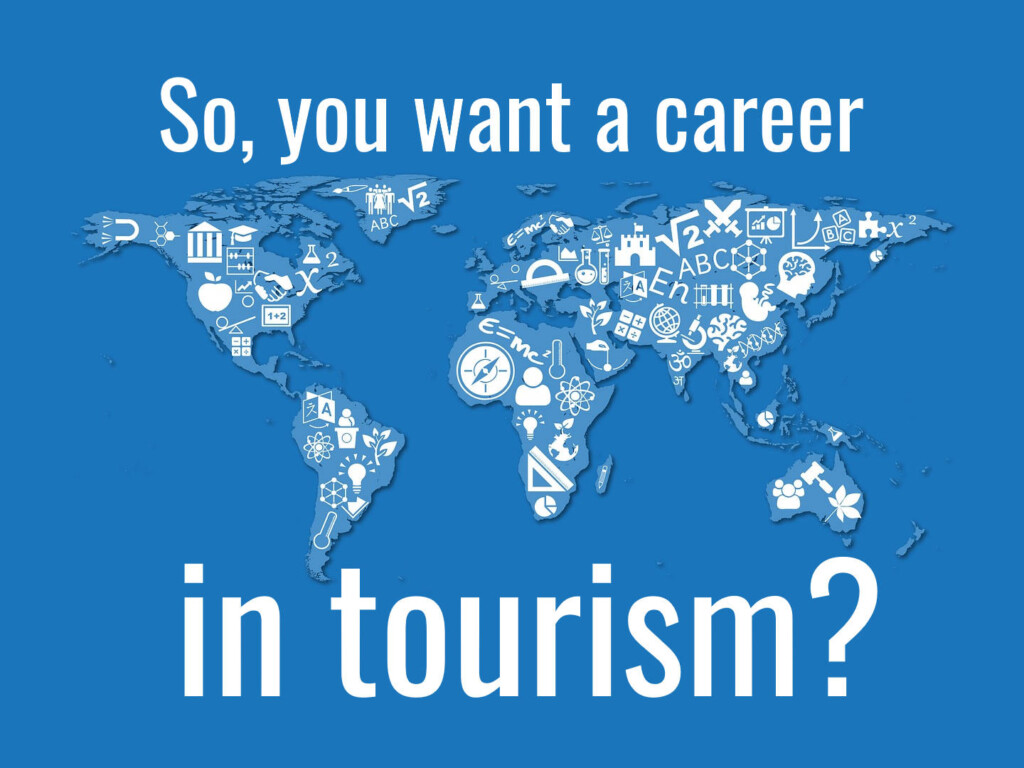Considering a career in tourism? Important things you should know in 2024

In 2024, what is the most important thing that a young person should understand before embarking upon a career in tourism?
It’s a “Good Tourism” Insight Bites question.
Your correspondent put the question to the travel & tourism stakeholders in the “GT” network, inviting emailed written responses of no more than 300 words.
Bites menu
- Be flexible and willing to learn
- Understand fundamentals and trends
- Academic training is not necessarily good for a career in tourism
- Listen to your elders
- Attitude
- Understand sustainability
- ‘There’s not a better career you could choose’
- Equip yourself with sustainability knowledge
- ‘Your work counts!’
- Sustainability: ‘Pivotal consideration’, ‘paramount importance’
- Adaptability: ‘Most crucial thing’
- ‘Crucial considerations’
- “GT” Insight BiteX (‘X’ is up to you)
- BiteX: Cosmetic solutions won’t build a more equitable supply chain
- What do you think?
- Featured image (top of post)
- Previous “GT” Insight Bites
Be flexible and willing to learn
Saverio Francesco Bertolucci, Commercial Assistant, VDB Luxury Properties, Spain
Being a young talent in this interesting and dynamic industry myself, this question directly relates to me and my career.
I would like to start with the premise that academic courses are very different from real life and the daily duties of young people who enter the workforce.
As a matter of fact, it is no surprise that every student finds their lives full of new and overwhelming workloads once they arrive in an organisation.
A lack of practical studies leads me to the conclusion that flexibility is the key characteristic every talent must embrace.
Being sociable and open to new ideas prepares one to better handle emergencies and yields more operational knowledge generally, although it entails a lot of physical and mental effort as well.
I would suggest that every young talent who is focused on his/her career keep going despite the lows that will always be present, and to respect your peers at every level whose knowledge, skills, and experience you can tap.
On this matter, it is fundamental to exploit the presence of the executives in your organisation to grasp as many insights as possible about the challenges they face.
Furthermore, the ability to learn from and to engage with clients is always a booster for life-changing opportunities, in particular inside hospitality and travel startups.
In any case, I would recommend carefully managing the precious holidays and free moments you are afforded to recharge and disconnect before you return to work!
Understand fundamentals and trends
Rwaka Mabrise, Communications Officer, Red Rocks Initiative for Sustainable Development & Red Rocks Rwanda
Before embarking upon a career in tourism, it’s crucial for a young person to understand that tourism is a dynamic and rewarding industry, and he /she must have a genuine interest in travel, culture, and hospitality and a passion for exploring new places and interacting with people from diverse backgrounds.

Young professionals must understand the tourism industry’s fundamentals and shifting trends, since this knowledge will help them navigate their careers effectively and adapt to change within the sector.
Excellent customer service is one fundamental. It’s at the core of the tourism industry. One should prioritise developing strong communication, problem-solving, and interpersonal skills to provide exceptional experiences for travellers and guests.
Young professionals should also be culturally sensitive, respectful, and open-minded, as this is fundamental in building positive relationships with and between tourists and local communities.
One trend, for example, is that the tourism industry and many of its customers are becoming increasingly conscious of environmental and social issues. Young professionals should therefore understand the importance of minimising environmental impact, respecting local cultures, and supporting community development initiatives.
[Red Rocks is a valued “Good Tourism” Partner]
Academic training is not necessarily good for a career in tourism
Richard Butler, Emeritus Professor of Tourism, University of Strathclyde, Scotland
Your question is next to impossible for me, as a long time academic, to answer.
Like many of my colleagues, my career has been in academia and thus I consider myself to be very inappropriate to comment on a career in tourism other than in the context of academia. The two worlds are further apart than some colleagues appear to think.
The world outside academia pays little attention, rightly or wrongly, to academics in fields such as tourism, so if a person is considering an academic career concentrating on tourism, they should prepare for an existence focused on academia with occasional forays into the ‘real’ world when their interests overlap.
If they are entering a career in the applied end of tourism, then they should be well prepared to handle people and human problems, and, as in most employment areas, to put the job’s interests above all else or suffer the consequences; unless they are prepared to leave that position. Sad but true in most cases.
In short, a career in tourism is like a career in any field, with a few twists such as the vulnerability of tourism to external forces, the attraction of possibly working in a location of high amenity, and the element of seasonality.
I am not sure academic training in tourism is necessarily a good training for working in tourism as some of the academic theories and principles receive little attention in the business of tourism.
Whether that is academics’ fault or the industry’s depends on your viewpoint.
Listen to your elders
Geoffrey Lipman, Creative Disruption Architect, SUNx Malta
Old people are really smart and you should listen carefully to them.
[SUNx Malta is a valued “Good Tourism” Partner]
Ed’s note: When reminded that he had 300 words to play with, Professor Lipman replied “Short is sometimes sweet …”
Attitude
Bert van Walbeek, consultant, author, and lecturer, UK
Attitude.
The tourism industry uses too many words, words, words, while little action is taken.
The rule ‘hire attitude, train skills’, which got me my first job at the Amsterdam Hilton in 1968, is still valid today.
“Still words, always words, the same words”
Dalida & Alain Delon ‘Paroles, paroles’
Understand sustainability
Pannita ‘Mai’ Sripramai, Senior Marketing Executive, Khiri Travel, Thailand
In 2024, it’s crucial for a young person considering a career in tourism to understand the significance of sustainability.

Recognising how tourism affects the environment, local communities, and cultural heritage is key.
They should prioritise responsible tourism, supporting local economies, and respecting cultural norms.
Strong communication, interpersonal skills, cultural sensitivity, problem-solving abilities, and adaptability are essential due to the diverse nature of tourists and destinations.
A solid understanding of geography and various travel destinations will further enhance their expertise in the field.
[Khiri Travel and Khiri Reach are valued “Good Tourism” Partners]
‘There’s not a better career you could choose’
Duncan M Simpson, Writer, Simply Hostels and Light travels, UK
The rewards are vast. A career in tourism offers travel, travel, and more travel.
And massive opportunities. So many different roles are possible; from management to house work, the opportunities are enormous.
The part of tourism I miss most is meeting, greeting, and serving people from around the globe, never knowing who might pitch up next.
Even if you never leave selling holidays in your home town, you’ll travel without travelling. You’ll meet people full of excitement for their holiday or a trip of a lifetime, happy at arriving or saddened by departure, because tourism is always about people.
Tourism provides massive chances to learn great customer service. That’s what makes tourism work, especially face to face, one to one.
And you’ll solve problems, from lost luggage, to overbooking, and crying children.
Skills at working with people are essential. Tourism is a constant battle to keep people happy and motivated because travel, despite its glamour, can also be tedious, full of dull waits, long hours, late nights, and early mornings.
A career in tourism will be full of challenge, especially today when hostile media, local communities, and the effects of climate change attack the business. In your career you’ll have to find new ways of doing travel, of keeping tourism alive. Your reward will be in overcoming those challenges, filling tourism with hope and dreams.
Take the work. It might last a lifetime and you may never come home again.
I loved the work I did in tourism. There’s not a better career you could choose.
Equip yourself with sustainability knowledge
Samut Bunnag, Junior Marketing Manager, LightBlue Consulting, Thailand
In 2024, young individuals eyeing a career in tourism need to understand the critical importance of preparing for a rapidly changing landscape, with sustainability at its heart.

The shift towards sustainable tourism reflects a deep-rooted change in the industry’s operation, driven by travellers’ growing demand for authentic, environmentally-responsible experiences that positively impact local communities and environments.
The rise of eco-lodges, green hotels, responsible wildlife tours, and certifications by entities like the Global Sustainable Tourism Council (GSTC) highlight the sector’s pivot towards sustainability.
This evolution calls for a new generation of tourism professionals, well versed in sustainability issues and capable of integrating such practices into their work.
Courses like those provided by LightBlue Learning are key to this preparatory phase, arming future professionals with essential knowledge and skills to lead sustainably. These programs delve into critical topics like food waste reduction, energy efficiency, and community engagement, offering actionable insights in addressing the industry’s challenges.
The significance of sustainability education is underscored by its adoption within hospitality schools. For instance, NHL Stenden University in the Netherlands and ESSEC University in France have integrated the Food Waste Prevention online course into their hospitality curriculum. This endorsement not only affirms the course’s relevance but also gears up the next tourism professional generation to embed sustainability into their careers.
Equipping oneself with sustainability knowledge and skills before embarking on a tourism career is not just beneficial but essential. It positions young professionals to lead the charge towards a more sustainable, responsible tourism industry for the planet and everyone on it.
‘Your work counts!’
Soile Veijola, Professor of Cultural Studies of Tourism, University of Lapland, Finland
A career in tourism?

You may go for business success followed by an intense lifestyle in fancy environments.
You can follow your heart by searching for an environment in which you can pursue your fondest hobby while earning your livelihood by inviting tourists to join you.
In fact, you can use your education and skills in tourism and hospitality work in so many ways!
Vocational training will allow you to work and travel all over the world. Higher education in tourism will provide you with an education comparable to a teacher’s; you’ll gain the skills of a generalist who can be employed in a wide range of jobs.
Moreover, both teachers and tourism professionals can use the opportunity to spread the knowledge and know-how of sustainable living and well-being.
It is worth noting that working life has changed remarkably over the last 40 years or so. When your grandparents and parents made their choices, the skills and knowledge achieved through experience and education were essential.
Gradually, however, emphasis has shifted from being a skilled employee to one who can create ‘positive audience effects’. A radiant smile and the skills that make customers happy, satisfied, and entertained are what matters.
Nowadays, those desired audience effects take place more in social media. The ‘tourist experience’ is a visual performance of the self against ‘an instagrammable backdrop’. The creation of seductive settings for this has become the driving force in the construction of tourist environments.
In this era of technology-mediated tourist experience, coupled with pleasures that are as luxurious as possible, the growing awareness of the need to live, build, and travel more sustainably makes jobs in tourism development, research, education, business, and service design poignantly influential.
Tourism can change lives and environments!
A tourist guide is a teacher.
Your work counts!
Sustainability: ‘Pivotal consideration’, ‘paramount importance’
AI: ChatGPT 3.5
In 2024, a pivotal consideration for a young person entering a career in tourism is the paramount importance of sustainability. The evolving landscape of global tourism demands a profound awareness of the industry’s impact on the environment, local communities, and cultural heritage.

Beyond the pursuit of economic gains, professionals in this field must prioritse responsible tourism practices to ensure the long-term well-being of destinations and their inhabitants. A crucial aspect involves recognising the intricate web of connections between tourism and its repercussions, ranging from environmental degradation to the erosion of cultural authenticity.
Young individuals in this field should grasp the significance of their role in mitigating adverse effects and fostering positive change. Prioritising responsible tourism involves supporting local economies, respecting cultural norms, and promoting sustainable practices.
Equipping oneself with a diverse skill set is equally vital for success in the dynamic tourism industry of 2024. Strong communication skills, interpersonal acumen, cultural sensitivity, problem-solving abilities, and adaptability are indispensable attributes. Given the diverse nature of tourists and destinations, these skills enable professionals to navigate various challenges and create positive experiences for all stakeholders involved.
Moreover, a solid foundation in geography and comprehensive knowledge of various travel destinations will amplify one’s expertise in the field. Understanding the geographical nuances, cultural nuances, and unique selling points of different locations enables professionals to tailor their approach and offerings, thereby enhancing the overall quality of the tourism experience.
In summary, as young individuals embark upon a career in tourism in 2024, a nuanced understanding of sustainability, coupled with a versatile skill set and comprehensive knowledge of destinations, will be instrumental for success in navigating the complexities of the industry while contributing to its positive evolution.
Adaptability: ‘Most crucial thing’
AI: Gemini
In 2024, perhaps the most crucial thing for a young person considering a career in tourism is adaptability. The industry is undergoing significant shifts, driven by factors like:

- Sustainability: Eco-conscious travel practices and responsible tourism are gaining major traction. Understanding and embracing sustainable principles will be key to future success.
- Technology: From AI-powered travel assistants to virtual reality experiences, technology is rapidly changing the tourism landscape. Embracing these advancements and staying adaptable will be crucial.
- Evolving traveler demands: Tourists are increasingly seeking personalised, authentic experiences. The ability to cater to these evolving needs and adapt to changing trends will be essential.
Therefore, while passion for travel remains important, a young person in 2024 stepping into tourism must be ready to adapt to a dynamic and evolving industry built on sustainability, technology, and personalisation.
‘Crucial considerations’
AI: Copilot
As we step into 2024, embarking upon a career in tourism holds immense promise and excitement. However, there are crucial considerations that young individuals should grasp before venturing into this dynamic field.

- Sustainability and Conscious Consumerism:
- Awareness of Environmental Impact: The tourism industry significantly impacts the environment. Understanding the environmental consequences is vital.
- Promoting Sustainable Practices: Advocate for sustainable tourism, minimise waste, and support eco-friendly initiatives.
- Balancing Economic Growth and Conservation: Striking a balance between growth and preserving natural and cultural heritage is critical.
- Adaptability and Resilience:
- Expect Volatility: Tourism is sensitive to global events. Be adaptable and resilient in the face of unexpected challenges.
- Diverse Skill Set: Beyond traditional skills, proficiency in crisis management, digital marketing, and community engagement is essential.
- Cultural Sensitivity and Empathy:
- Respecting Local Cultures: Understand local customs and norms.
- Empathetic Engagement: Treat locals with kindness and empathy.
- Ethical Considerations:
- Avoiding Exploitation: Be aware of potential exploitation.
- Balancing Profit and Social Responsibility: Responsible tourism benefits both travellers and host communities.
- Continuous Learning and Adaptation:
- Stay Informed: Keep up with industry trends and technological advancements.
- Lifelong Learning: Pursue certifications and engage in networking.
In summary, a successful career in tourism requires passion, adaptability, cultural sensitivity, and a commitment to sustainability. Young professionals who embrace these principles will contribute to a thriving and responsible industry.
“GT” Insight BiteX (‘X’ is up to you)
The “Good Tourism” Blog offers a great opportunity to any travel & tourism stakeholder who wishes to express themself in writing for the benefit of “GT’s” thoughtful and open-minded readers. To feature in the next “GT” Insight Bite compilation, send no more than 300 words (300 words or fewer (</=300 words)) on any tourism-related idea or concern you may have. “GT’s” publisher will personally help with basic copy editing, so don’t by shy if you lack confidence in writing English.
Send your “GT” Insight Bite and picture to [email protected]
BiteX: Cosmetic solutions won’t build a more equitable supply chain
Shane K Beary, CEO, Track of the Tiger, Thailand
During the COVID-19 pandemic, some of us emphasised the need to create a more equitable supply chain within the tourism industry by tackling these persistent issues:

- Tourism leakage from host countries. These reach alarming rates. They’re as high as 70% in Thailand, for example.
- Exorbitant commissions (circa 30%) levied by OTAs.
OTA excess can be checked, with minimal disruption, by introducing a new online booking platform — levying much lower commissions — that is custom-designed for a ‘best-practice-compliant’ responsible tourism sector.
Equally important is the need to ensure an equitable distribution of tourism revenue and opportunity to micro, small, and medium-sized enterprises (MSMEs) within the sector, currently disenfranchised by the SEO system. This would allow them and the communities they operate in to foster responsible practices and mitigate future challenges, including those related to climate change and global instability.
Example 1. Implementing ‘responsible tourism driven’ sustainable agriculture projects for rural schools. Such projects yield chemical-free produce for nutritious school lunches, enhancing learning outcomes. Surplus produce is sold locally, funding educational resources. Students are equppied with valuable sustainable agricultural skills that can be applied within their families, creating secondary income streams. Both increase access to further education, both academic and vocational.
Example 2. In coastal areas, efforts should focus on marine ecosystem restoration projects, such as building fish habitats, restoring coral reefs, expanding mangrove forests, and undertaking research studies. By funding and collaborating with local communities on such endeavours, both tourists and community members benefit significantly, whilst also addressing the broader environmental concerns that affect us all.
In both examples, and several others as yet unmentioned, the market appeal is strong, and the potential ROI far exceeds the funding required.
To summarise, the solutions are there. They do, however, require all stakeholders to look beyond their own narrow self-interests and see the bigger picture.
[Track of the Tiger is a valued “Good Tourism” Partner]
What do you think?
In a comment below share your own thoughts about what someone considering a career in tourism should know. SIGN IN or REGISTER first. (After signing in you will need to refresh this page to see the comments section.)
Or write a “GT” Insight or “GT” Insight Bite of your own. The “Good Tourism” Blog welcomes diversity of opinion and perspective about travel & tourism, because travel & tourism is everyone’s business.
This is an open invitation to travel & tourism stakeholders from any background to share their thoughts in plain English with a global industry audience.
“GT” doesn’t judge. “GT” publishes. “GT” is where free thought travels.
If you think the tourism media landscape is better with “GT” in it, then please …
Featured image (top of post)
Map image with symbols by Harish Sharma (CC0) from Pixabay. “GT” added the question: “So, you want a career in tourism?”
Previous “GT” Insight Bites
- What did tourism learn from the COVID-19 pandemic?
- In 2024, what are the best opportunities for tourism over the next five years?
- Tourism’s biggest challenges & threats over the next five years to 2028
- On empowerment, promotion, and the power of expression
- On enrichment, repatriation, the double-edged blade, and war
- On tourism technology, progress, and local benefit-sharing
- Hey, travel & tourism, are you ‘neocolonialist’?
- Who’s the new boss? Asia Pacific tourism industry association seeks leader
- ‘The hospitality industry offers a great career.’ Really?
- Cruise ships: Blessing or blight?
- Tourist vs traveller: What’s the difference?
- The heads of finance, operations, and PR walk into their boss’s office …
- Yes, Tourism Minister
- What are tourism’s biggest challenges & threats over the next five years?
- ‘Tourism is built on the backbone of white supremacy’. What do you think?
- Really, what’s the difference? ‘Sustainable tourism’ vs ‘regenerative tourism’
- Want a career in tourism? Important things you should know
- Diverse perspectives on travel & tourism and a fairer world
- Diverse perspectives on economic degrowth and tourism
- Diverse perspectives on visitor dispersion








